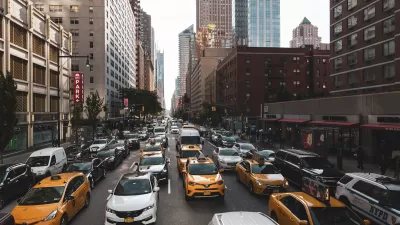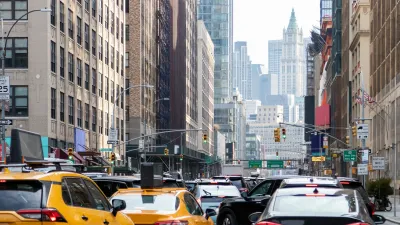New York City’s congestion pricing program, suspended by Governor Hochul earlier this year, would have pumped $12 billion into local projects and jobs.

Companies in the tri-state region surrounding New York City will lose about $12 billion in MTA contracts and 100,000 jobs due to Governor Hochul’s suspension of New York City’s congestion pricing program, a new analysis reveals.
As Gersh Kuntzman points out in an article for Streetsblog NYC, roughly $12 billion in capital investments that would have been funded through congestion pricing revenue was set to pay for contracts with private-sector companies throughout the region. “Those companies have done well, and provided thousands of well-paying jobs, in the prior decade of MTA capital expenditures, and would likely have tapped into the 2020-24 capital plan that was partly funded by congestion pricing, but is now being slashed.”
Paradoxically, “Many of the biggest recipients of MTA contracts over the past decades are in districts represented by avowed congestion pricing opponents.” A senior policy advisor for Reinvent Albany, the group that conducted the analysis, “was surprised that so many lawmakers object to a plan to fund MTA capital improvements that end up benefitting so many of their constituents and local businesses.”
FULL STORY: Hochul’s Congestion Pricing ‘Pause’ Will Cost Area Companies Billions

Study: Maui’s Plan to Convert Vacation Rentals to Long-Term Housing Could Cause Nearly $1 Billion Economic Loss
The plan would reduce visitor accommodation by 25,% resulting in 1,900 jobs lost.

North Texas Transit Leaders Tout Benefits of TOD for Growing Region
At a summit focused on transit-oriented development, policymakers discussed how North Texas’ expanded light rail system can serve as a tool for economic growth.

Why Should We Subsidize Public Transportation?
Many public transit agencies face financial stress due to rising costs, declining fare revenue, and declining subsidies. Transit advocates must provide a strong business case for increasing public transit funding.

How to Make US Trains Faster
Changes to boarding platforms and a switch to electric trains could improve U.S. passenger rail service without the added cost of high-speed rail.

Columbia’s Revitalized ‘Loop’ Is a Hub for Local Entrepreneurs
A focus on small businesses is helping a commercial corridor in Columbia, Missouri thrive.

Invasive Insect Threatens Minnesota’s Ash Forests
The Emerald Ash Borer is a rapidly spreading invasive pest threatening Minnesota’s ash trees, and homeowners are encouraged to plant diverse replacement species, avoid moving ash firewood, and monitor for signs of infestation.
Urban Design for Planners 1: Software Tools
This six-course series explores essential urban design concepts using open source software and equips planners with the tools they need to participate fully in the urban design process.
Planning for Universal Design
Learn the tools for implementing Universal Design in planning regulations.
Ascent Environmental
Borough of Carlisle
Institute for Housing and Urban Development Studies (IHS)
City of Grandview
Harvard GSD Executive Education
Toledo-Lucas County Plan Commissions
Salt Lake City
NYU Wagner Graduate School of Public Service





























